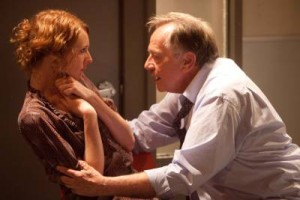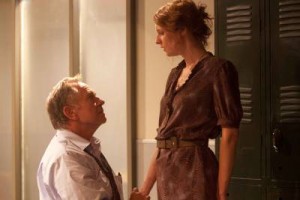
A 30ish woman confronts the 60ish man who had sex with her when she was only 12 in David Harrower’s harrowing Blackbird, now shocking, disturbing, and dare I say entertaining audiences in equal measure in its Los Angeles premiere by Rogue Machine Theatre.
Before I’m accused of giving too much away in my first sentence, let me assure you that this startling bit of information comes out a mere ten minutes into the play, and any attempt to discuss Blackbird without revealing its central conceit would be frustrating at best. In any case, whatever preconceived notions you might have of Blackbird as a staged version of a cable TV revenge melodrama will quickly be dispelled by the playwright’s unclichéd (and even poetic) dialog and unpredictable plot twists, especially as directed to razor-sharp perfection by Robin Larsen and performed by a pair of utterly brilliant actors.
Our first glimpse of Peter (Sam Anderson) and Una (Corryn Cummins) finds them mid-conversation in the trash-strewn break room of an unnamed company, and though we’re at first unaware of the reason for their confrontation, one thing is crystal clear. Peter wants out and Una is not about to let him get away. Peter’s coworkers, whose shadowy figures are glimpsed through the room’s translucent windows, seem as curious as we are about what’s going on between this disparate pair, but we have the advantage of being inside the room with them. Indeed, because Stephanie Kerley Schwartz’s scenic design in Theatre/Theatre’s smaller space is so utterly realistic, it seems almost as if chairs and risers had been added to a preexisting factory room, and not the other way around.
Were Blackbird a novel, a writer like Jodi Picoult (whose 400+ page tomes deal with precisely this type of dark, twisted subject matter) would fill us in with every detail of Peter and Una’s past relationship from both points of view, and from the points of view of the people who surrounded them, and quite a compelling novel it would make.
The challenge—and the excitement—of Blackbird as an eighty-minute, two-character play is that whatever we know about the older man and younger woman comes from what they tell each other during their real-time encounter. We hear her story as she remembers it, and his as he does, or at least in the way that each one wants the other to think that he or she remembers it. As for the details of Peter’s current life or Una’s, we have to take their word on it, and do so with a grain of salt, since the potential for prevarication is very real indeed. Thus, playwright Harrower keeps us particularly on our toes, filling in the blanks as best we can, and his play is all the stronger for making its audiences think.
Blackbird is far too complex for clichés, and anyone expecting a black-and-white predator-victim tale will have to search elsewhere. Is Peter the serial molester that child abuse advocates would like him painted as, or was Una (as he insists) only a one-time thing? Is he being honest about the man he claims to have become, or merely describing a life he wants her to see him in? Is Una a grown-up abuse survivor looking simply for closure, or does her visit hide far different urges? Be prepared to hash over these questions with your fellow playgoers as you exit the theater following Blackbird’s disquieting blackout.
One more thing about Harrower’s script as published by Dramatists Play Service Inc. and staged by Rogue Machine. Whoever tweaked it for American audiences deserves major props, as there’s not a moment you’d think that it was written by a Scottish playwright, save the unlikelihood of Una’s surname.
Lead performers Anderson and Cummins can now be added to the list of the year’s stunning dramatic duos, which have included Johnny Clark and Michelle Clunie, Mike Farrell and Jim Parrack, and Morlan Higgins and Adolphus Ward.
Anderson, Scenie winner for his unforgettable work in The Bird And Mr. Banks, is equally unforgettable here as a man whose seeming harmlessness (he looks to be the last person any parent would worry about leaving their child with) makes his past transgressions all the more shocking, and whose air of sincerity makes his claims of redemption all the more credible should we choose to believe him. It is as tough a role as Anderson has ever undertaken, emotionally and physically draining (credit fight choreographer Edgar Landa for the latter), and he is as on top of it as you’d expect an actor half his age to be.
The remarkable Cummins is equally well cast. There’s a toughness to her that makes you wonder how she could ever have been a victim, yet the lone tear that falls unexpectedly down her cheek reveals the wounded child within. The talented young actress brings a feline fierceness to the role, matching Anderson in power and depth every step of the way, so that when …
I’ll stop myself before giving anything more away. Suffice it to say that Anderson’s and Cummins’ work must surely match the best of any actors who may have tackled these roles in previous productions.
Casey Burke makes a highly effective eleventh hour appearance. Dana Lyn Baron and Alec Tomkiw are seen mostly only as distorted images through frosted glass, but their presence adds significantly to the realism of Larsen’s staging.
Leigh Allen’s lighting design is remarkably varied considering the one-set, real-time nature of Harrower’s script. Christopher Moscatiello’s sound design adds subtly to the suspense. Jocelyn Hublau Parker’s costumes suit each character to a T. Property designer Ilona Piotrowska gets a round of applause for filling Schwartz’s set with fast food detritus like you may never have seen on the legitimate stage. Sasha Sobolevsky is stage manager, David Mauer technical director, Amanda Mauer production manager, and Darryl Johnson assistant director. Blackbird is produced by John Perrin Flynn, Matthew Elkins, and Edward Tournier.
I had avoided Blackbird when it first opened, the darkness of its subject matter suggesting a play that might prove overly disturbing to this somewhat faint-hearted reviewer. Disturbing it is indeed, but (as mentioned in the first paragraph) highly entertaining as well, and well worth seeing for that reason alone. Even amidst the darkness and despair, it is a theatergoing treat to savor the superb work being done by Anderson and Cummins—literally within touching distance. Blackbird gives playgoers one more reason to sample the many treasures of Los Angeles theater.
(Note: Blackbird’s current schedule—Saturdays and Sundays at 5:00 and Mondays at 8:00—makes it particularly easy to program into even the busiest theatergoing schedule.)
Rogue Machine, Theatre/Theater, 5041 W. Pico Boulevard, Los Angeles. Through September 12. Saturdays and Sundays at 5:00, Mondays at 8:00. (No performances August 20 and 29) Reservations: 855 585-5185
www.roguemachinetheatre.com
–Steven Stanley
July 25, 2011
Photos: John Flynn




 Since 2007, Steven Stanley's StageSceneLA.com has spotlighted the best in Southern California theater via reviews, interviews, and its annual StageSceneLA Scenies.
Since 2007, Steven Stanley's StageSceneLA.com has spotlighted the best in Southern California theater via reviews, interviews, and its annual StageSceneLA Scenies.







 COPYRIGHT 2024 STEVEN STANLEY :: DESIGN BY
COPYRIGHT 2024 STEVEN STANLEY :: DESIGN BY